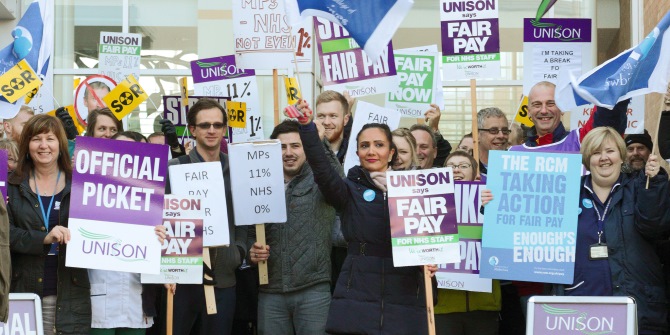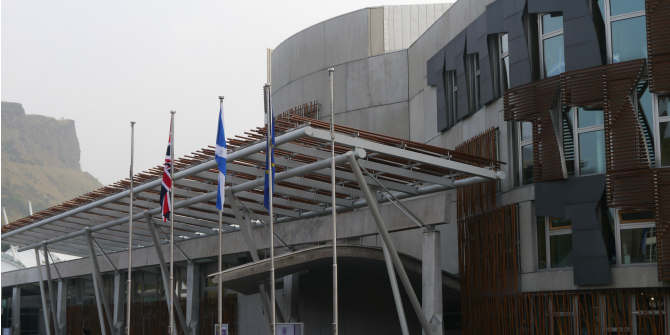 The economy is understood through stories, accounts, and images; in other words, it is imagined. Thinking about imagined economies, writes John Clarke, makes it possible to reflect on how ‘The Economy’ is made to appear a thing apart, rather than being a social and political product and thereby open to social and political action.
The economy is understood through stories, accounts, and images; in other words, it is imagined. Thinking about imagined economies, writes John Clarke, makes it possible to reflect on how ‘The Economy’ is made to appear a thing apart, rather than being a social and political product and thereby open to social and political action.
In my everyday life I live with a puzzle. I am constantly required to witness the fact that the most material, powerful, muscular feature of social life in the present is the economy. It orders everything else I experience. Yet I encounter the economy through stories, accounts, and images that tell me about its state of health (it’s not been well lately), its needs and desires (mainly more of everything), its failings (nervous faltering) and potential (to make us all happy). In such ways, economies are imagined. This is not to deny that economic relationships, processes, practices exist – but to insist that our relationship to them is mediated by a variety of projections about what an economy is, should be, or might become (if only set free). And – despite the claims about The Economy as if there was only one – there are always many imagined economies in circulation.
To some of my friends and colleagues, this puzzle is trivial, meaningless or even downright wrong. The economy, economic forces, dynamics and interests are the most real, material forces active in the world at present, and to even talk about imagined economies risks deflecting attention from the challenge that they represent. In this, many on the left and right are in agreement even if they might disagree about how to evaluate and account for the power of The Economy. They agree with Bill Clinton when, in 1992, he claimed ‘It’s the economy, stupid’.
Yet I am surrounded by swirls of imagined economies, in which I am invited to recognise myself, see my needs being met, identify future actions, and grasp my relationships with others. In the currently dominant version, I am invited to see myself as a hard working and responsible family, trying hard to meet my needs and those of my nearest and dearest. I am a striving worker, always seeking to better myself and increase my opportunities. I am a demanding consumer, avidly comparing price/quality balances and engaging in the hard work of seeking satisfaction. I aspire to be a valuable employee, an excellent provider and a good (i.e., low cost and law abiding) citizen. All the while I am helping to propel the organisation that employs me, the place where I live and work, and my nation to global success. This is a profoundly compelling story. It is one that keeps being recycled in spite of the accumulating evidence of its failures at every scale between the individual and the global. Despite these glitches, this imagined economy dominates many of the spaces where I live my life – organisationally, politically, and culturally. And it always promises improvement next time around.
Despite its power, and the claims that ‘there in no alternative’, this is not the only imagined economy available to us. For example, there are ethical economies being imagined (and sometimes put into practice) in which care for the environment, responsible consuming, and reciprocal exchanges between producers and consumers are valued. Such imaginaries interrupt the dominant ones, unsettling its presumed aspirations to progress, improvement and growth. Others contrast the fantasies of the virtual or financialised economy with the memory of a ‘real economy’ in which people made and exchanged material things, objects with social value.
There are also imagined moral economies, which address the perceived separation between the economy and social life, in which economies stand separate from, and threaten to undermine, key aspects of social and political life. Moral economies promise to redress that separation, whether they are in the shape of economics that promise to be socially useful or shaped by higher values (promoting happiness, perhaps). Imaginary moral economies were recurrently summoned in European politicians’ empty promises of a newly moral capitalism in the wake of the 2008 crash. The ideal of a moral economy can also be traced in the current UK coalition government’s promises of an economy of ‘fairness’ in austerity, despite the increasingly unequal distribution of that programme’s costs and benefits. Both of these examples of imagining ‘moral economies’ seek to harness people back to the dominant imagined economy, while trying to overcome some of its obvious defects (its tendency to crises, its evident unfairness). Other moral economies involve reimagining the relationships between people, between production and consumption, and between the economy and the environment.
Why would I want to treat economies as imagined? For me, doing this enables a critical distance between talk about The Economy (and the strange fantasies, projections and promises that flow in such talk) and the effects and experiences of current forms of organising economic processes and relationships. Thinking about imagined economies makes it possible to reflect on how The Economy is made to appear a thing apart, rather than being a social and political product and thereby open to social and political action. Talking of imagined economies points to how different imaginaries circulate and offer competing visions. This feels important in a world where we are mostly invited to admire or even revere The Economy, in all its singular glory.
These are times when such space for critical reflection is increasingly necessary, given all the things that are done in the name of The Economy. Imagined economies are a sort sceptic’s device, creating some distance between the claims about The Economy and how we might live – and creating some space for thinking about how we might live differently. Making other imagined economies visible provides resources for thinking about relationships, priorities, values and alternative futures. They do not, of course, guarantee them coming true but, in these desperate times, thinking otherwise matters. Certainly, such alternatives – capturing diverse ideas of communal, collective, socially useful, environmentally oriented, or even democratically ordered forms of economic life – will be dismissed as archaic, utopian, unrealistic, or inefficient. But the dismal, and deepening, failures of the ‘realistic’ pursuit of efficiency need to be countered by ways of thinking – and being – otherwise. The idea of imagined economies provides me with one way of engaging with this possibility.
Note: This article gives the views of the author, and not the position of the British Politics and Policy blog, nor of the London School of Economics. Please read our comments policy before posting. Featured image credit: Lending Memo CC BY 2.0
 John Clarke is Visiting Professor in the Department of Sociology and Social Anthropology at Central European University and Emeritus Professor in the Faculty of Social Sciences at The Open University. His book, Disputing Citizenship, with Kathy Coll, Evelina Dagnino and Catherine Neveu, is available from The Policy Press. Other selected publications at Open Research Online.
John Clarke is Visiting Professor in the Department of Sociology and Social Anthropology at Central European University and Emeritus Professor in the Faculty of Social Sciences at The Open University. His book, Disputing Citizenship, with Kathy Coll, Evelina Dagnino and Catherine Neveu, is available from The Policy Press. Other selected publications at Open Research Online.







